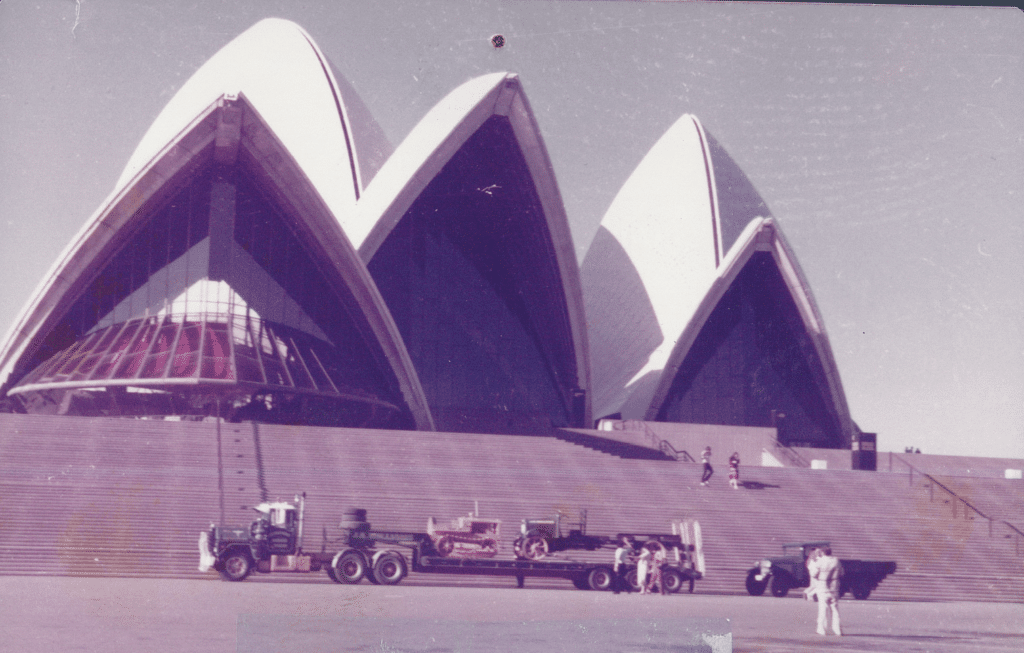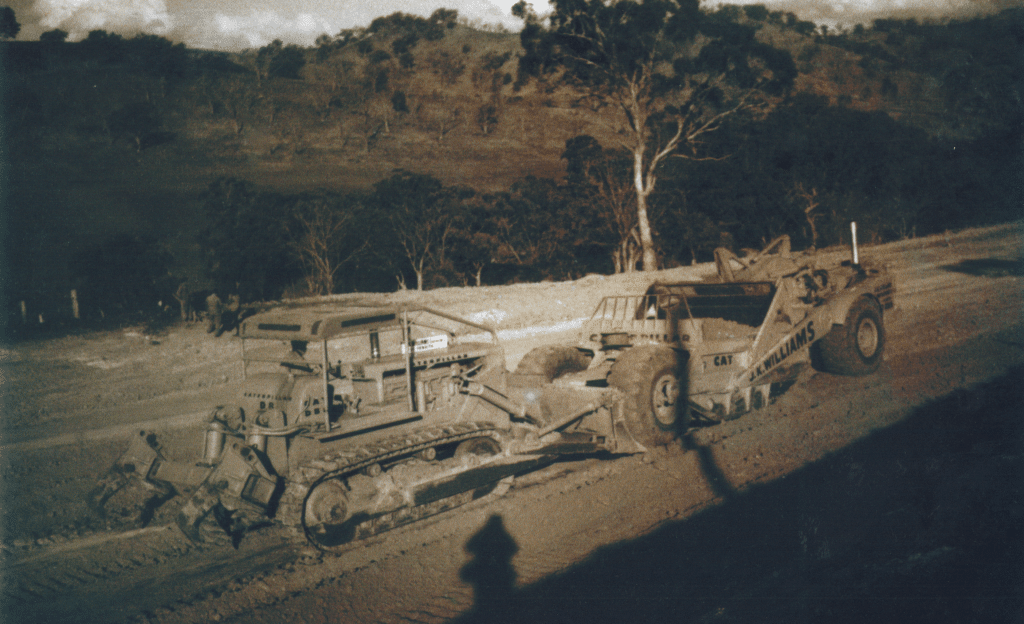
There are certain things that become synonymous with an area. For Penrith, at the foot of the Blue Mountains, it must be JK Williams. With the dark blue background and bright yellow lettering their trademark is distinctive and solid. I grew up knowing the name and recognising those trucks. My father, Ivan Casson, has always said, “If you want it done right, get JK Williams”.

Last year I had the privilege of meeting a special group of people who knew the founder of this company, Jack Williams. These people shared their memories of Jack from his early days in earthmoving to his untimely death in 1979.
John Kenneth Williams, or Jack or JK as he was known to many people was born on the 14th August, 1926 in Dubbo. Jack was orphaned at a young age but was brought up in the Dubbo area. His early years are sketchy for those who are left, but his impact, on the earthmoving industry, especially in Penrith, as well as his employees, friends and business associates was enormous.
I entered the offices of JK Williams located on Jack Williams Drive, Penrith and was greeted by Leigh Hartog, the Managing Director and owner of JK Williams. Leigh started at the company as a surveyor back in 1974. Hospitality was abundant but time was scarce for this man who now runs one of the most successful earthmoving companies in NSW. Despite Jack’s death when he was only 52 years old in a light plane crash, his legacy lives on. When I asked Leigh what word he would use to sum up Jack Williams, the word he used was “ethical”.
This was not a surprise as “ethical” and “honesty” are words that crop up in conversations about Jack Williams. Jack was a man of his word and most of his contracts were based simply on a handshake.
In the early 1950’s Jack and his wife, Pauline, arrived in Mt Kiera, Wollongong. Pauline has been driving trucks since she was about 15 years old. Their son Michael was born in Wollongong. Three more sons would follow over the years, Rory, Jamie and Darrie.
Jack started up a business with his best mate, Owen Went. Williams and Went operated a small transport business, carting fish from as far south as Eden to the Sydney Fish Markets and carting general freight on the return trip. This partnership dissolved after a few years. Owen joined Brambles as one of their top low loader/float drivers. He worked for Brambles until he retired.
When Jack was about 24 years old, he and Pauline were at Dubbo Pool when a young 14 year old Warren Barber gave Pauline a shove, causing her to end up in the swimming pool. The consequences of this action could have gone either way, but Warren invited Jack and Pauline home to his parents’ place for dinner and a great friendship was born.
Jack and Pauline with son Michael moved to Penrith around 1955. With the purchase of an ex-army 1942 NR Mack and 1939 ex-army bulldozer Jack started to work for Australian Blue Metal Quarry at St Marys. Jack obviously had his eye on the future and it was here that he met Gil Lighezzolo, who would later become one of his construction foreman at JK Williams.
Jack was renting a small yard at this stage, behind the office of Alex Leitch on the corner of High and Evan Streets, Penrith. Jack’s first employee was Laurie Jefferies.
A few years later, Warren Barber came to Sydney working on the railways. Jack was working 7 days a week in Penrith and so when he needed a day off Warren would arrange for a day’s leave from his own job and fill in for Jack. The strength of the friendship was forged through work and by 1958 Warren was employed by Jack at JK Williams which allowed the company to move more into subdivisions under Warren’s careful eye. Warren would later become a partner in the business and after Jack’s death Warren and Brian Turner would continue to run JK Williams until they retired from the business, the mantle then passing to Leigh.
In 1958 Jack left full time work at the quarries and started in subdivisions. This was the beginning of a very successful business in Penrith and surrounding areas. Jack worked long, hard hours but with the guidance of Warren Barber these subdivisions were completed on time and to a high standard. With loyal machine operators like Les “Bluey” Armstrong, Dick Price, Bill Hollier, Des Butcher and Laurie Jefferies and an extremely efficient workshop run by brothers Don, John, Bill and Bob Clark keeping all of the machinery in tip top condition there was no looking back. The office was also running smoothly through the efforts of Ken Henson, Laurie Rose, Mike Webb and June Carr.

In the mid 1960’s Jack was working on the removal of the overburden, mainly along Castlereagh Road. To expose the gravel he had two CAT D7’s and two D8’s. These hauled the scrapers which worked very well but Jack had a scientific approach to many things and decided he wanted to quicken the pace. He purchased six used Le-Torneau Westinghouse rubber tyre scrapers. These did indeed speed up the job but then it started to rain. The overburden was wet and the rubber tyre scrapers kept getting bogged, the job slowing to a halt until the weather cleared.
Later, Jack operated a 621 CAT Open Bowled Scraper pulled by a CAT D8 out on Castlereagh Road stripping the overburden to recover gravel and sand. The gravel would then be sent to one of three quarries for crushing – Farley and Lewers Quarry on the Bird’s Eye Corner on Castlereagh Road, Emu Plains Quarry at Emu Plains or to Pioneer Quarries also on Castlereagh Road (but close to what is now the Penrith Lakes Scheme).
In 1970 business was doing well and so Jack purchased 2 brand new 631 Open Bowled Scrapers followed by a D9E CAT dozer.
In 1973 Jack was ready to purchase a brand new truck, a Drake float and dolly. This new truck would supersede his old Mack – a B615. Before making the purchase, however, he asked Ross Stein, one of his drivers, what type of truck he would want. Ross replied “- a 325 hp V8 Maxidrive Mack truck”. “And what would you have in it?” Ross had a very modest wish list, which included a Cool King Roof and Bostrom seat and a bull-bar. Three months later, Jack called Ross to say that the truck was ready but would he, Ross, mind if Jack and his son, Darrie, flew to Queensland to bring the truck, float and dolly back. This was Jack’s purchase and yet he was treating it as though the truck belonged to Ross. Whilst Jack flew to Queensland, Ross made a phone call. Ross wanted a sign writer to paint the words “Jack’s Mack” across the front of the truck. The truck was forever known as “Jack’s Mack”.
In 1975 Jack sold his D9, scrapers and low loaders to Brambles. This was the end of his quarry work.
Warren Barber, involved in the subdivision side of JK Williams, had been running this side of the business very successfully so Jack offered Warren and Brian Turner to become financial partners with him. Warren and Brian would run JK Williams whilst Jack took a less active role.
Darrie spoke of his dad as a “farmer at heart”. He was resilient and adaptable. He worked hard and he played hard. He was a man with a great sense of fun and enjoyed a joke, even when it was on him.

A story that was shared was when Jack’s beloved Black Label Jonny Walker was replaced with cold tea. (The accountant still denies it was him). Jack had a fondness of gelignite too and put it to good use, especially when it came to removal of trees but often this caused more problems than solutions.
Jack’s interests then turned to other things. He purchased two properties at Turondale and Sofala in western NSW, mainly breeding beef cattle. He was the first to grow lucerne in this district. Some of his friends speculated how much cattle were actually sold as he had named many of them and when asked the names of his working dogs, the idea of “working” dogs was scoffed at. They were his pets. Weekends often consisted of the Jack’s sons, motorbikes and mates staying on one or the other of these properties. Camp beds were set up in a big shed and the weekends were full of fun, dust and mud.
Another property was purchased on the south coast at Narooma where Jack has an airstrip constructed. Jack had decided to learn to fly. He purchased a Piper Lance in America. He then had Evan Davies, an experienced pilot, fly it to Australia. Jack commenced flying lessons and loved to be up in the air with his instructor and his whippet, Frisky. He flew regularly to his properties, often with his employees.
Sadly and shockingly, on the 30th April, 1979, Jack and his instructor were on their return leg from Narooma to Camden. Both men were killed when the plane lost its tail and hit the ground near Marulan, in the southern highlands. Some of the landmark projects that the company, JK Williams, has been involved with include the construction of a large twin pipeline for Penrith Council and levelling and getting the site ready for the construction of Glass Containers Factory. Subdivisions such as Bel Air, Glenmore Park housing estates and Peach Tree Industrial Estate in Penrith and Glen Alpine housing estate – near Campbelltown are just four in a long list of road construction projects handled by JK Williams. In fact, to date, the company has completed 78% of housing development and 42% of commercial lots in the Penrith local government area. The company also had a large involvement in the Penrith Lakes Scheme for the Olympics – the Olympic Rowing Course and the White Water Rafting course.
The final word about JK Williams comes from Ross Stein, a long time employee who describes Jack Williams as one of “nature’s gentleman”. Ross has four sons who have all worked for JK Williams at different times and his son Bradley has been with the company for over 20 years. As Ross says about the genesis of the company –
“This has been achieved by a man who had limited education, little family life as a child, but the determination to make his mark, by hard work and honesty and the shake of a hand. How times have changed.”
By Jane Bannon
Published in the Australian Earthmoving Magazine – Jan/Feb 2012
There are certain things that become synonymous with an area. For Penrith, at the foot of the Blue Mountains, it must be JK Williams.
JK Williams prides itself on utilising and sourcing the very latest in technology fit for business purpose. We are not solely focused on what is an aid to constructionany functions of the business.